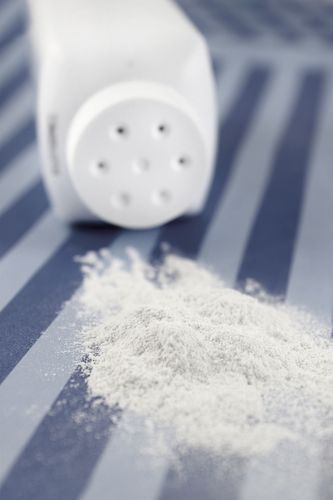Top Class Actions’s website and social media posts use affiliate links. If you make a purchase using such links, we may receive a commission, but it will not result in any additional charges to you. Please review our Affiliate Link Disclosure for more information.

The federal agency stated that there is not sufficient evidence to prove a possible connection, and that it might shake up the consumer market because of how often talcum powder is used.
For generations, talcum powder has been used as a personal hygienic product for men and women across the United States in treating diaper rash, dry skin, and yeast infections.
It most famously manufactured and utilized by Johnson & Johnson, in the company’s shower-to-shower and baby powder products. Unfortunately, it has been found by some studies that these products can allegedly cause women to develop ovarian cancer, when applied to their genital area.
Despite the recent allegations of this correlation, talc remains one of the most popularly commercialized materials in the United States, with no signs of stopping. This is alarming, as various medical experts have documented hundreds of cases of ovarian cancer, where the victim had applied talcum powder to their genital area.
They claims that when talc is applied to these sensitive areas, the particles enter the patient’s bloodstream and implant themselves in the fallopian tubes of the patients.
Experts note that once the talc particles enter and embed themselves in the ovaries of women, they behave similarly to asbestos fibers festering inside a victim’s lungs.
By this logic, numerous scientists have called for the FDA and other government safety regulators to launch intensive investigations into talc products, as they may be a prevalent danger in the homes of millions of Americans. Unfortunately, the FDA has yet to take any significant action against the risk, causing outcry from various activism groups.
Overview of Talcum Powder Ovarian Cancer Concern
Unfortunately, the FDA’s stance on talcum powder may be difficult to break as it goes back for years. According to the agency’s records, rejection of talcum powder concerns stem back as far as 1972, when public health officer of Baltimore County Health Department, Barry Castleman, had requested the agency investigate potential dangers attached to talc.
The agency responded a month later by stating that Castleman must prove that the product was a threat, before the agency takes any such action. When it was requested again, the FDA stated that “manufacturers of cosmetic products and ingredients, do not need FDA approval before they go on the market.”
The FDA has repeatedly stated that despite talc proving to have a similar nature and behavior pattern as asbestos, it is not a confirmed carcinogen so the agency cannot accept the possibility of cosmetic talc being related or contaminated with asbestos.
However, pressure has increased against the FDA over the last few years for failing to address this risk, which did spur the agency to run its own investigation.
After requesting raw talc samples from different talc mines in the United States, the agency contracted a Maryland lab to examine 34 talc samples to determine if they were like asbestos, or if they were contaminated by asbestos.
The results found no trace of asbestos, with the agency stating that while there were was room for error in their inquiry, such as limited raw talc samples, there was no reason to believe that cosmetic talcum powder was dangerous.
Talc is used in over 4,200 different cosmetic items in North America and is found in more than 40,000 pharmaceutical products. With its vast popularity and long legacy of happy users, it is easy to understand why the FDA would feel complacent about this product, and would be reluctant to admit any risk.
However, numerous women and medical experts defiantly state that there is an association, and that ovarian cancer should be mentioned as a potential side effect on talcum powder products. Several of these women have already filed legal action against Johnson & Johnson, and are calling for the FDA and other health officials to warn consumers of talcum powder ovarian cancer risk.
Do YOU have a legal claim? Fill out the form on this page now for a free, immediate, and confidential case evaluation. The attorneys who work with Top Class Actions will contact you if you qualify to let you know if an individual lawsuit or class action lawsuit is best for you. [In general, baby powder cancer lawsuits are filed individually by each plaintiff and are not class actions.] Hurry — statutes of limitations may apply.
ATTORNEY ADVERTISING
Top Class Actions is a Proud Member of the American Bar Association
LEGAL INFORMATION IS NOT LEGAL ADVICE
Top Class Actions Legal Statement
©2008 – 2024 Top Class Actions® LLC
Various Trademarks held by their respective owners
This website is not intended for viewing or usage by European Union citizens.
Get Help – It’s Free
Join a Free Baby Powder Cancer Class Action Lawsuit Investigation
If you used Johnson’s Baby Powder, Shower to Shower, or another talcum powder product and were diagnosed with ovarian cancer, you may have a legal claim. Family members of loved ones who died of ovarian cancer can also join. Submit your information now for a free case evaluation.
An attorney will contact you if you qualify to discuss the details of your potential case at no charge to you.












